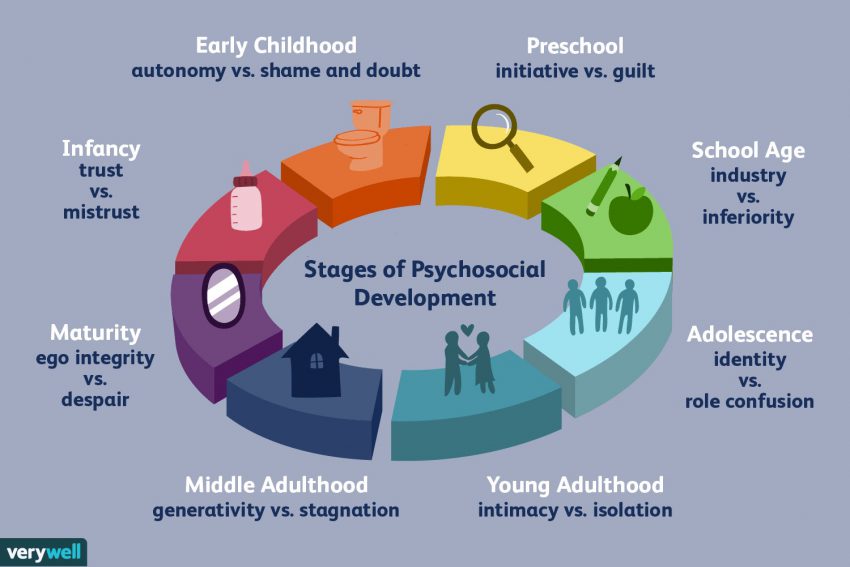The goal of “growing up” is to become fully actualized, fully integrated, fully balanced adults—adults who can enter society with confidence and provide meaningful skills and benefits to society as a whole. This growth happens most effectively in our relationships. COVID-19 has disrupted and stalled the growth of young adults and adolescents because it has greatly interrupted the mentoring relationships that are necessary for growth. This is best understood through Erik Erikson’s stages of development.
Stages of Development
Erikson describes the fundamental building blocks of our psychosocial development through his “stages.” None of us progresses through these stages perfectly in time with our age, but all of us progress and are stuck at different stages depending upon how we attain the psychological and social skills we need to develop in order to grow into fully actualized adults. You can see all of the stages described by Erikson in the image above.
In my work at the Miller Summer Youth Institute, I spend the majority of my time with adolescents and young adults who are living in the Identity vs. Role Confusion and Intimacy vs. Isolation stages. All of the work at SYI surrounds two foundational questions, “Who is God calling you to be?” and “What is God calling you to do?” This is because I understand that in safe, mentoring relationships, students need to ask these questions and find some answers (and even better questions) to the foundational questions of life.
Purpose and Identity
In the first of these stages, Identity vs. Role Confusion, the goal is that we grow into humans who are aware of their purpose in the world. Someone who actualizes in this stage is able to communicate and think fully about what it means to be uniquely themselves. This growth best happens in the context of dedicated mentoring relationships with trusted adults. Those who do not actualize in this stage find themselves frustrated and afraid. Often these young adults experience a host of problems because they have not found a sense of purpose in life.
Once a young person has begun to solidify their own identity and worth, they are able to engage in intimate relationships more fully. This growth is described in the stage of Intimacy vs. Isolation. In this stage of development, we find “our people”—those outside of our family unit alongside whom we chose to make life. It is in these intimate relationships that we find our long-term partners, spouses, and friends. Those who do not actualize in this stage they find themselves most often in isolation, without deep relationships, without support systems they need to fully actualize into the next stage.
COVID-19 and Youth Development
COVID-19 has made it nearly impossible for adolescents and young adults to progress in their development. The strange circumstances severely limit access to mentoring relationships with adults and distance young people from intimate relationships with peers. In order to stay safe, we must keep a distance. But in keeping a distance, we have stunted the development of these young people. It will take these young adults and adolescents longer to find their sense of purpose. Surviving this pandemic was and is our chief responsibility as humans. When social distancing is relaxed and we are safe to be in close contact with one another, the work of development will resume. It is our responsibility as adults in the Middle Adulthood and Maturity stages to provide opportunities for those at the stages typically found in younger people to work through their development in safe spaces. We need to normalize the fact that their development has been stalled and give them opportunities to grow into their own identity and then into intimate relationships.
The COVID-19 pandemic has altered all of our lives. The lives of those preparing for adulthood has been impacted developmentally as well. All of our lives have been interrupted. Their development has been interrupted also. Erik Erikson’s stages of development give us the opportunity to understand what is happening with young people today and what they will be growing into for years to come.
The Rev. Erin Davenport is a 2005 alumna of the MDiv program at Pittsburgh Theological Seminary. Through the Seminary’s joint degree program, she also earned her MSW from the University of Pittsburgh. A former chaplain, she now resides in Pittsburgh and serves as the Seminary’s director of the Miller Summer Youth Institute.

